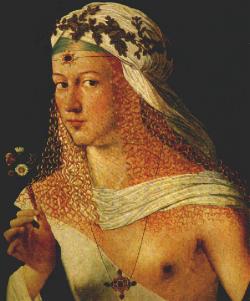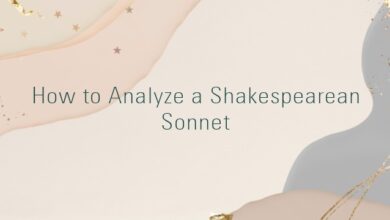
William Shakespeare – Sonnet 127
In the old age black was not counted fair,
Or if it were, it bore not beauty’s name;
But now is black beauty’s successive heir,
And beauty slandered with a bastard shame:
For since each hand hath put on Nature’s power,
Fairing the foul with Art’s false borrowed face,
Sweet beauty hath no name, no holy bower,
But is profaned, if not lives in disgrace.
Therefore my mistress’ eyes are raven black,
Her eyes so suited, and they mourners seem
At such who, not born fair, no beauty lack,
Sland’ring creation with a false esteem:
Yet so they mourn becoming of their woe,
That every tongue says beauty should look so.
With the commencement of the so called ‘Dark Lady’ sonnets, there is a marked change of tone from that of serene reflection on a love that has been almost eternized, to a slightly disturbed analysis of a passion which is at times close to frenzy. The opening sonnet introduces his mistress as ‘black’, but then digresses unexpectedly into a tirade against cosmetics and face painting, something which Shakespeare never found easy to tolerate, for he seems to equate it with a falseness in human relations. The argument of the poem seems to be that his beloved mistress is black because it is symbolic of a mourning for the debasement of true beauty. His love having taken on this guise of black mourning, it has now become so fashionable that common opinion has swung round to believing that dark beauties alone are truly beautiful. He therefore feels that his passion for her is justified.
The praise of fair or blonde beauty, and the criticism of its counterpart, is made easier by the looseness of meaning of the word ‘fair’ in English, since it can signify both light coloured and beautiful, as well as having a range of moral applications, as in Macbeth:
Fair is foul and foul is fair
Hover through the fog and filthy air. Mac.I.1.10-11.
The counterpart to fairness, described by words such as black, dark, foul, immediately gives access to a tone of moral opprobrium and condemnation, as for example in 147:
For I have sworn thee fair, and thought thee bright,
Who art as black as hell, as dark as night.The tradition of praising one’s mistress as fair was well established, and may be found in Petrarch’s sonnets to Laura. The counter tradition also seems to have been well defined early on, both in the Italian sonnets, and at an early date in the English speaking world, in Sidney’s Astrophel and Stella, of which I give Sonnet 7 (below left). It was printed in 1591 but was in circulation in manuscript from 1581 onwards. By the time Shakespeare’s sonnet sequence was published in 1609, the fashion for sonneteering was already passed, but the secret fascination for dark haired beauties no doubt long outlasted the fashion for sonnet writing.
It is difficult to know how significant the darkness of the dark lady was. Should we equate it with the feelings of guilt often attached to male sexual desires, repressed or otherwise, or should it be seen as a light hearted, conventional, and somewhat frivolous explanation of and justification for an extreme emotional entanglement? In terms of Mediterranean types of beauty, the idealisation of fairness seems almost nonsensical, unless it was adopted simply because it was known that such types were relatively rare and therefore they were thought to be unattainable. In England one wonders what the situation of the Mary Fittons of the world and all the other brunettes might have been, if their darkness was considered to be synonymous with hell, and night, and hidden desires. ( Although it seems that Mary Fitton herself was fair, which rather disqualifies her from the title of Dark Lady). Fortunately the demotic sexual tradition has often taken little account of religious and puritanical views of restraint and repression. Fortunately, that is, for the continuation of the human race. The historical record is however heavily biased in favour of literary works written by educated men and the influences and prejudices they detail are often distinctive of that class and social background. Roman Catholic ideas of the sinfulness of sexuality were always close at hand in Elizabethan England. Shakespeare, as an educated man, would have been imbued with those ideas. It may well be that part of the tradition was secretly to consider dark haired women more libidinous, and therefore more desirable, and the association with them more sinful. At any rate Shakespeare seems to have found his mistress entirely irresistible, and his account of the liaison does not show him to be free of guilt either. This sonnet however still remains a puzzle, because it seems to be such an odd way to start a series of poems in praise of one’s mistress. It is perhaps because all the praise has already been lavished on the beautiful youth, the true love of his heart, that this part of the series can only be a tortured raking over of the coals of desire for a woman who has tempted his lust. The truth is that, if one is looking for poems expressive of everlasting love, one turns to the main sequence of sonnets to the youth. But if one wishes to know what the effect of guilty and ‘sinful loving’ is on a mind sensitive to most of the tortures of the human heart, then one looks at the sonnets to the ‘dark lady’.
There are many verbal links in Sonnet 127 to the four preceding ones, for example bastard, born, disgrace, Nature, Art, which implies that its position here was quite deliberately chosen. Or else the motifs of 123-6 have been unconsciously carried over into this sonnet.
There are also resemblances to Love’s Labour’s Lost IV.3.228-70, and the full extract is printed below for easy comparison. Some additional comments are also added thereunto.
Sidneys Sonnet 6 from Astrophel and Stella shows that Stella is black, dazzling and beautiful, and also makes use of the association of black with mourning.
ASTROPHEL AND STELLA
VI
When Nature made her chief work – STELLA’S eyes
In colour black why wrapt she beams so bright?
Would she in beamy black, like painter wise
Frame daintiest lustre, mixed of shades of light?
Or did she else that sober hue devise,
In object best to knit and strength our sight?
Lest if no veil these brave gleams did disguise,
They sun-like should more dazzle than delight.
Or would she her miraculous power show?
That whereas black seems beauty’s contrary
She, even in black, doth make all beauties flow!
But so and thus, she minding LOVE should be
Placed ever there, gave him this mourning weed;
To honour all their deaths, which for her bleed.
The 1609 Quarto Version
IN the ould age blacke was not counted faire,
Or if it weare it bore not beauties name:
But now is blacke beauties ſucceſſiue heire,
And Beautie ſlanderd with a baſtard ſhame,
For ſince each hand hath put on Natures power,
Fairing the foule with Arts faulſe borrow’d face,
Sweet beauty hath no name no holy boure,
But is prophan’d, if not liues in difgrace.
Therefore my Miſterfſe eyes are Rauen blacke,
Her eyes fo ſuted,and they mourners ſeeme,
At ſuch who not borne faire no beauty lack,
Slandring Creation with a falſe eſteeme,
Yet ſo they mourne becomming of their woe,
That euery toung ſaies beauty ſhould looke ſo.
Commentary
1. In the old age black was not counted fair,In the old age = in olden times.
black = dark, brunette. The ideal of female beauty in Renaissance literature and sonnets is a blonde. This ideal possibly goes back to the ancient world, and Helen of Troy. However blackness was not seen as entirely undesirable, and is praised even in the The Song of Solomon.
I am black, but comely, O ye daughters of Jerusalem, as the tents of Kedar, as the curtains of Solomon. Look not upon me because I am black, because the sun hath looked upon me: my mother’s children were angry with me, they made me the keeper of the vineyards; but mine own vineyard have I not kept. 1.5-6.
It may be that the old age refers back only to the reign of Elizabeth, whose fair reddish hair was chivalrously considered to be the ideal of female beauty. As she grew older she relied much on thick cosmetics and wigs. Shakespeare could be taking a swipe here at that practice, which he seems to have disliked intensely.
not counted fair = was not considered beautiful.2. Or if it were, it bore not beauty’s name;it bore not beauty’s name = it did not have the reputation of being beautiful, it was not called beautiful. The line is almost contradictory, for it seems to say ‘if black was beautiful, it was not beautiful’, but mentally one supplies the extra links to give ‘if it were in fact considered to be beautiful it nevertheless was not given the appellation’.3. But now is black beauty’s successive heir,successive heir = succeeding to, inheriting her (beauty’s) title. Probably with a pun also on ‘hair’.4. And beauty slandered with a bastard shame:slandered = given a bad reputation.
a bastard shame = a shame caused by the bastardy of blackness, which is not the true child of beauty; a shame attached to the name of bastard, since beauty itself is now no longer genuine, but of false parentage, i.e. cosmetics (as explained in the next two lines).5. For since each hand hath put on Nature’s power,put on Nature’s power = taken over the power of Nature to allocate beauty. The phrasing is suggestive of applying powder or rouge or white lead to the face, as if Nature’s power could be equated with a thick layering of cosmetics.6. Fairing the foul with Art’s false borrowed face,Fairing the foul = making beautiful what is ugly
Art’s false borrowed face = the artificial face put on by the use of cosmetics, and the skilful application of them.7. Sweet beauty hath no name, no holy bower,hath no name – has no renown, as all beauty is now, or could be, artificial; has lost her claim to being called ‘beauty’; has lost her name through the shame of being bastardized; has lost her name through being slandered, having now been made black, instead of fair.
no holy bower = no sacred precinct in which to be worshipped. Gods and goddesses of antiquity had holy bowers and groves set aside and dedicated to them. Shrines would often be erected to them in such places.8. But is profaned, if not lives in disgrace.profaned = cast out of the temple, barred from the holy places. From the Latin word profanus meaning ‘before i.e. outside the sanctuary or temple’.
if not lives in disgrace – It is not clear what is the worse penalty, to be pronounced profane, or to live in disgrace. They probably mean approximately the same thing, although, since one is dealing with the abstract and fanciful idea of beauty as a goddess, one need not insist too rigidly on an exact meaning. It is interesting that the word is an echo from the previous sonnet, in which Nature supposedly disgraces Time by protecting the youth. Here Art has disgraced Nature by making false effigies of beauty. disgrace could also mean ‘to make ugly, to disfigure’.9. Therefore my mistress’ eyes are raven black,Therefore – the logical connection between the colour of his mistress’ eyes and what has been described in the previous eight lines is not clear. It seems that one is meant to understand that the eyes are in mourning for the death of beauty, and are therefore clothed in black. But since we assume that black is their natural colour, they cannot have put on mourning weeds for this occasion only, unless they also are guilty of disguising their true colour. The poet is evolving a fanciful conceit that his mistress’ eyes became aware of how others were bastardising true beauty and therefore put on mourning in sympathy with her.
raven black = black like a raven’s feathers.10. Her eyes so suited, and they mourners seemHer eyes – many editors emend to her brows, or her hair, to avoid the rather banal repetition of ‘eyes’. It also explains the phrase so suited, which would mean ‘dressed in a similar fashion’. Alternatively one could change eyes in the line above to brows. The fact that her hair is black is indicated by 130:
If hairs be wires, black wires grow on her head.
suited– a pun on sooted is possibly intended.11. At such who, not born fair, no beauty lack,mourners / at such who – the modern idiom would be ‘mourners for’. Those referred to are the ones who, lacking natural beauty, make up for it by adorning themselves with cosmetics.12. Sland’ring creation with a false esteem:Slandering creation = by falsely interfering with natural beauty, slanderously indicating that created things are bad.
esteem – estimation, valuation. By painting themselves other than they are, they create a false estimation of their worth.13. Yet so they mourn becoming of their woe,so they mourn = they mourn in such a way that; they mourn so intensely. they = sc. my mistress’ eyes.
becoming of their woe = their appearance is ideally suited to their grief. Presumably, his mistress’ eyes, which are naturally black, look like true and fitting mourners for beauty slandered by false devotees.14. That every tongue says beauty should look so.
Every tongue = everyone. Compare:
All tongues, the voice of souls, give thee that due, 69.
beauty should look so = beauty should look just like your eyes look; beauty should look like you; you are now the true icon of beauty.
Additional notes
FROM LOVE’S LABOURS LOST.
BER. My eyes are then no eyes, nor I Berowne:
O, but for my love, day would turn to night!
Of all complexions the cull’d sovereignty
Do meet, as at a fair, in her fair cheek,
Where several worthies make one dignity,
Where nothing wants that want itself doth seek.
Lend me the flourish of all gentle tongues,–
Fie, painted rhetoric! O, she needs it not:
To things of sale a seller’s praise belongs,
She passes praise; then praise too short doth blot.
A wither’d hermit, five-score winters worn,
Might shake off fifty, looking in her eye:
Beauty doth varnish age, as if new-born,
And gives the crutch the cradle’s infancy:
O, ‘tis the sun that maketh all things shine.
FERD. By heaven, thy love is black as ebony.
BER. Is ebony like her? O wood divine!
A wife of such wood were felicity.
O, who can give an oath? where is a book?
That I may swear beauty doth beauty lack,
If that she learn not of her eye to look:
No face is fair that is not full so black.
FERD. O paradox! Black is the badge of hell,
The hue of dungeons and the suit of night;
And beauty’s crest becomes the heavens well.
BER. Devils soonest tempt, resembling spirits of light.
O, if in black my lady’s brows be deck’d,
It mourns that painting and usurping hair
Should ravish doters with a false aspect;
And therefore is she born to make black fair.
Her favour turns the fashion of the days,
For native blood is counted painting now;
And therefore red, that would avoid dispraise,
Paints itself black, to imitate her brow.
DUM. To look like her are chimney-sweepers black.
LON. And since her time are colliers counted bright.
FERD. And Ethiopes of their sweet complexion crack.DUM. Dark needs no candles now, for dark is light.
BER. Your mistresses dare never come in rain,
For fear their colours should be wash’d away.
FER. ‘Twere good, yours did; for, sir, to tell you plain,
I’ll find a fairer face not wash’d to-day.
BER. I’ll prove her fair, or talk till doomsday here. LLL.IV.3.228-70.
1. In the old age black was not counted fair,
2. Or if it were, it bore not beauty’s name;
3. But now is black beauty’s successive heir,
4. And beauty slandered with a bastard shame:
5. For since each hand hath put on Nature’s power,
6. Fairing the foul with Art’s false borrowed face,
7. Sweet beauty hath no name, no holy bower,
8. But is profaned, if not lives in disgrace.
9. Therefore my mistress’ eyes are raven black,
10. Her eyes so suited, and they mourners seem
11. At such who, not born fair, no beauty lack,
12. Sland’ring creation with a false esteem:
13. Yet so they mourn becoming of their woe,
14. That every tongue says beauty should look so.
The closest similarity of the two is in the following lines:
O, if in black my lady’s brows be deck’d,
It mourns that painting and usurping hair
Should ravish doters with a false aspect;
And therefore is she born to make black fair.
Her favour turns the fashion of the days,
For native blood is counted painting now;
Berowne uses the conceit that his beloved’s brows are black because they mourn for those who are tricked by false beauties adorned with cosmetics. usurping hair = wigs. Compare lines 9-12. And he notes that it has now become the fashion to be black (i.e. dark skinned, or dark faced). Compare line 14.






